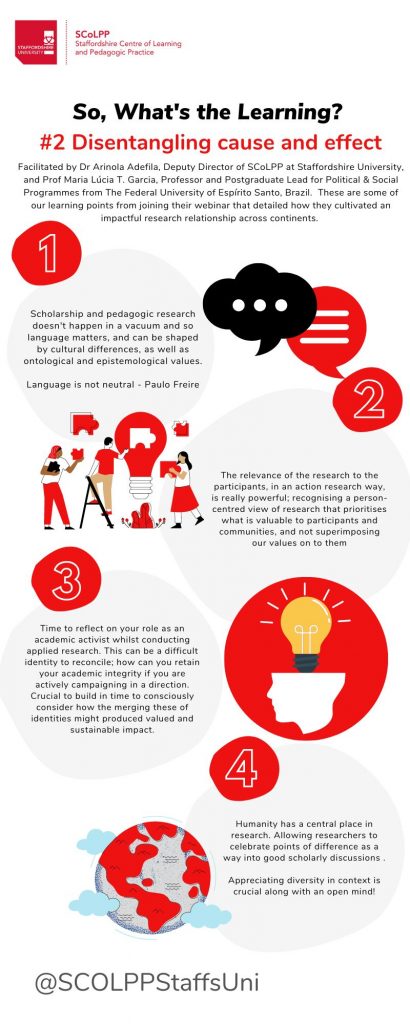By Paul Orsmond and Dr Eleanor Atkins
Learning in higher education (HE) is about the individual. For many students formal learning is primarily an individual event; as is the assessment of learning, the delivery of feedback (individual and anonymous), and student progression. Collaborative work, where it occurs, is principally organised by tutors, but it’s often the individuals within groups who are assessed. Individual students provide feedback on their individual experiences for the National Student Survey. Learning is about acquiring ‘know what’ and ‘know why’. As a result, an independent learner is formed. This is problematic.
Higher education must deliver inter/transdisciplinary education and generate graduates who are capable of collaboratively solving modern global challenges, including climate change. This requires transformative competencies such as ‘reconciling tensions and dilemmas’, working in an ‘interdependent’ fashion and creating new knowledge and values. In addition to ‘know what’ and ‘know why’, this requires ‘know who’ and ‘know how’. Learning as an individual event will not deliver. What is to be done?

We need to take another look at what learning is. To address external demands of future learning, HE needs to become more familiar with social learning. There are five key themes to social learning.
Theme 1. Participation – contrary to established thinking, learning is more than acquisition of knowledge and cognitive understanding. It’s participatory. We need both acquisition and participatory learning models in operation.
Theme 2. Context – ‘know how’ and ‘know who’ are always learnt in context through participating in practices. Knowledge doesn’t reside just in the head, isolated from the world. For social learning, knowledge is always in person in practice – this is called knowledgeability. Such knowledge isn’t transferred. It cannot be taught in the decontextualised classroom. It must be experienced. You must do it yourself.
Theme 3. Practices – learners develop practices, such as negotiating meaning, through participating with others. This learning allows for the development of learner identities.
Theme 4. Identities – learners, such as students, develop new (professional) identities as they learn. Learning isn’t just about knowing more, it is about becoming someone different. These new identities are not always recognisable to learners in themselves.
Theme 5. Belonging – with new shared identities learners have a new sense of belonging. This allows more effective working together, imagined possibilities and the development of shared learning histories and relationships.
Do these themes look familiar? They should. This is because we are all social learners. These themes represent how learning takes place within a community of practice (CoP). Higher education is made up of many different communities where social learning is taking place. Hence, learners in higher education are not just students; everyone is a learner. How can we tap into that huge resource?

Phenomenon-based learning, encapsulated within CoP, spans learning across universities and with societies outside universities. In the February ‘What’s the Learning’ session we want to work with you in developing a university wide Global Challenge. Using the UN 17 Sustainable Development Goals, we want to begin to construct a curriculum that allows all learners to be part of global sustainability.





